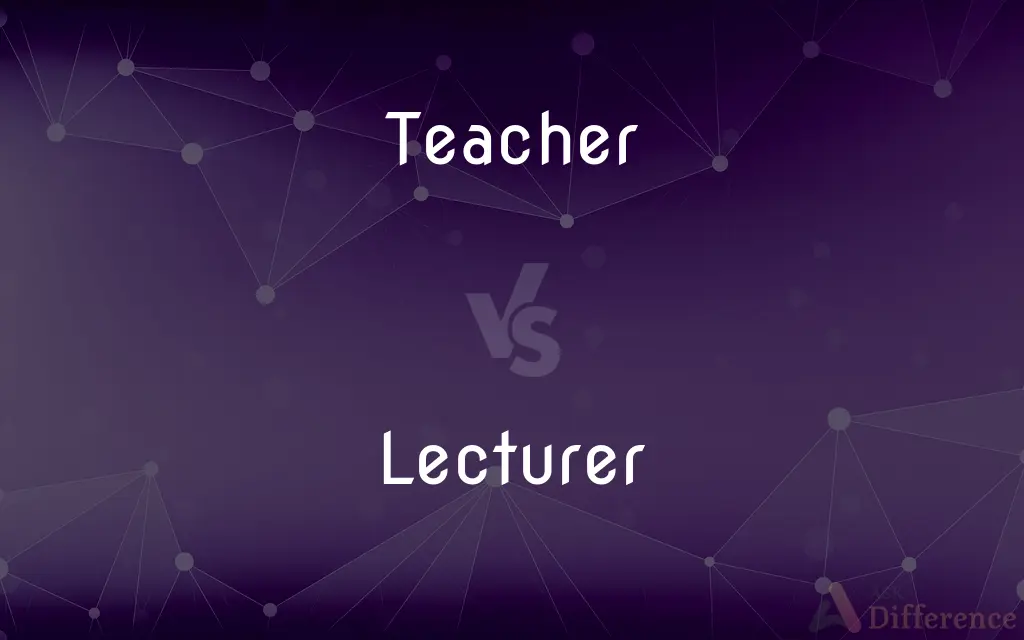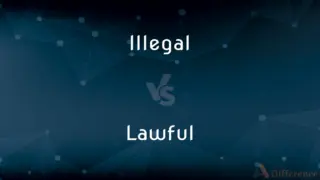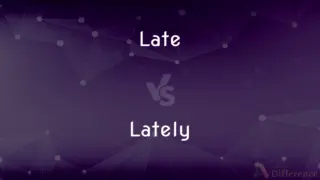Teacher vs. Lecturer — What's the Difference?
By Tayyaba Rehman — Updated on September 19, 2023
A teacher instructs students at primary and secondary school levels, while a lecturer imparts knowledge to university or college students. Both educate, but they function at different educational stages.

Difference Between Teacher and Lecturer
Table of Contents
ADVERTISEMENT
Key Differences
Teacher and lecturer both fall under the broad category of educators, yet they differ in their primary areas of operation. A teacher typically works in elementary, middle, or high schools, instructing students from early childhood to adolescence. Conversely, a lecturer is positioned within colleges and universities, engaging with adult or young adult learners.
The role of a teacher often extends beyond just imparting knowledge. They are also responsible for fostering a well-rounded development in students, which includes social skills, discipline, and personal growth. A lecturer, on the other hand, mainly focuses on delivering specialized content in a particular subject area.
In terms of interaction, a teacher frequently has a more hands-on approach, closely monitoring students' progress, and offering personalized feedback. Lecturers, while still approachable, might not always have the same degree of personal interaction due to larger class sizes and the nature of tertiary education.
Teachers usually follow a structured curriculum set by educational boards or institutions, assessing students via tests, projects, and assignments. Lecturers provide assessments too, but they often have more freedom in curating their syllabus, basing it on the latest research and academic developments.
The qualifications required for a teacher and a lecturer differ. While both necessitate a strong educational background, teachers generally hold degrees in education or their teaching subject, complemented by teaching credentials. Lecturers typically possess advanced degrees, such as a Ph.D., in their field of expertise.
ADVERTISEMENT
Comparison Chart
Educational Level
Elementary, middle, or high schools
Colleges and universities
Main Focus
All-around development of students
Specialized content in a subject area
Interaction
More hands-on with individual students
Less personal due to larger class sizes
Curriculum
Structured by educational boards
Often self-curated based on academic research
Typical Qualifications
Degree in education or subject + teaching credential
Advanced degrees (e.g., Ph.D.)
Compare with Definitions
Teacher
An individual who educates students in schools.
Mrs. Brown is a beloved teacher at the local elementary school.
Lecturer
A scholar who delivers educational talks in colleges or universities.
Dr. Smith is a lecturer in sociology at the city university.
Teacher
An instructor of a particular subject or grade.
She's the math teacher for the sixth grade.
Lecturer
Someone holding advanced qualifications teaching in higher education.
As a lecturer, he's published several papers on molecular biology.
Teacher
A role model and mentor for students in an educational setting.
The influence of a good teacher can be life-changing.
Lecturer
An expert imparting specialized knowledge at tertiary institutions.
The lecturer discussed recent research findings in today's session.
Teacher
A professional responsible for imparting knowledge and skills.
The teacher prepared engaging activities for the class.
Lecturer
An academic staff member responsible for course instruction.
The lecturer outlined the syllabus for the semester.
Teacher
Someone guiding students' academic and personal growth.
The teacher noticed Jamie's talents and nurtured them.
Lecturer
Lecturer is an academic rank within many universities, though the meaning of the term varies somewhat from country to country. It generally denotes an academic expert who is hired to teach on a full- or part-time basis.
Teacher
A teacher (also called a schoolteacher or formally, an educator) is a person who helps students to acquire knowledge, competence or virtue. Informally the role of teacher may be taken on by anyone (e.g.
Lecturer
One who delivers lectures, especially professionally.
Teacher
One who teaches, especially one hired to teach.
Lecturer
A member of the faculty of a college or university usually having qualified status without rank or tenure.
Teacher
A person who teaches, especially one employed in a school.
Lecturer
A faculty member ranking below an assistant professor.
Teacher
The index finger; the forefinger.
Lecturer
The academic rank held by such a faculty member.
Teacher
An indication; a lesson.
Lecturer
Chiefly British A university teacher, especially one ranking next below a reader.
Teacher
(Mormonism) The second highest office in the Aaronic priesthood, held by priesthood holders of at least the age of 14.
Lecturer
A person who gives lectures, especially as a profession.
Teacher
One who teaches or instructs; one whose business or occupation is to instruct others; an instructor; a tutor.
Lecturer
A member of a university or college below the rank of assistant professor or reader.
Teacher
One who instructs others in religion; a preacher; a minister of the gospel; sometimes, one who preaches without regular ordination.
The teachers in all the churches assembled.
Lecturer
(dated) A member of the Church of England clergy whose main task was to deliver sermons (lectures) in the afternoons and evenings.
Teacher
A person whose occupation is teaching
Lecturer
One who lectures; an assistant preacher.
Teacher
A personified abstraction that teaches;
Books were his teachers
Experience is a demanding teacher
Lecturer
A public lecturer at certain universities
Lecturer
Someone who lectures professionally
Lecturer
An educator delivering talks or presentations on specific topics.
The guest lecturer spoke about innovations in renewable energy.
Common Curiosities
Can a teacher become a lecturer?
Yes, with additional qualifications, a teacher can transition to being a lecturer.
Who usually has smaller class sizes?
Typically, teachers in schools have smaller class sizes compared to lecturers in large university courses.
Do all teachers require a teaching license?
In many regions, yes. Teachers usually need a teaching credential or license.
Can lecturers teach in schools?
Typically, no. Lecturers are specialized for tertiary education, while teachers are trained for schools.
Are the roles of a teacher and lecturer the same?
No, while both are educators, a teacher works in schools, and a lecturer works in colleges or universities.
Is a lecturer's role only to deliver lectures?
No, a lecturer may also be involved in research, mentoring, and administrative duties.
What's the primary focus of a lecturer?
A lecturer primarily focuses on imparting specialized academic knowledge.
Do teachers have to follow a set curriculum?
Generally, yes. Teachers often adhere to a curriculum set by educational boards.
What's a primary difference in their audiences?
Teachers usually instruct children or teenagers, while lecturers teach young adults or adults.
Do lecturers have to conduct research?
Often, yes. Many lecturers in universities are involved in academic research.
Can lecturers be involved in extracurricular activities?
Yes, some lecturers might oversee clubs or activities in universities.
Do teachers get academic freedom like lecturers?
Teachers usually have less academic freedom than lecturers since they follow set curriculums.
Are all lecturers professors?
No, being a lecturer and a professor are different roles in academia.
Is a Master's degree mandatory for a lecturer?
Often, yes. Many institutions prefer lecturers to have a Master's or even a Ph.D.
Who interacts more closely with students?
Typically, teachers interact more closely due to smaller class sizes and the school setting.
Share Your Discovery

Previous Comparison
Illegal vs. Lawful
Next Comparison
Late vs. LatelyAuthor Spotlight
Written by
Tayyaba RehmanTayyaba Rehman is a distinguished writer, currently serving as a primary contributor to askdifference.com. As a researcher in semantics and etymology, Tayyaba's passion for the complexity of languages and their distinctions has found a perfect home on the platform. Tayyaba delves into the intricacies of language, distinguishing between commonly confused words and phrases, thereby providing clarity for readers worldwide.














































